Deck 10: Genome Evolution
Question
Question
Question
Question
Question
Question
Question
Question
Question
Question
Question
Question
Question
Question
Question
Question
Question
Question
Question
Question
Question
Question
Question
Question
Question
Question
Question
Question
Question
Question
Question
Question
Question
Question
Question
Question
Question
Question

Unlock Deck
Sign up to unlock the cards in this deck!
Unlock Deck
Unlock Deck
1/38
Play
Full screen (f)
Deck 10: Genome Evolution
1
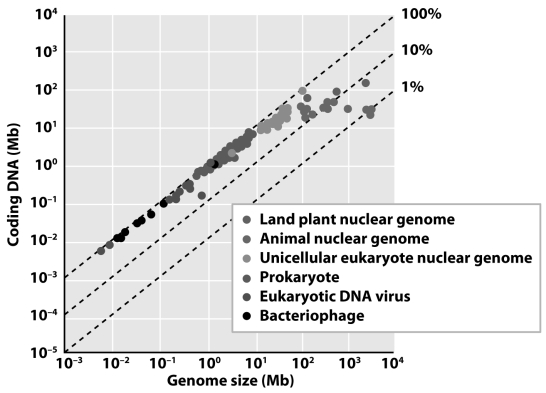 From the figure above,one can deduce that larger genomes
From the figure above,one can deduce that larger genomesA)tend to have a greater proportion of coding DNA than smaller genomes.
B)tend to have a lesser proportion of coding DNA than smaller genomes.
C)have more splice variants.
D)code for more proteins.
B
2
The C-value paradox is
A)the lack of correlation between genome size with organismal complexity.
B)resolved by the identification of noncoding DNA.
C)resolved by the discovery of linkage disequilibrium.
D)A and B
E)All of the above
A)the lack of correlation between genome size with organismal complexity.
B)resolved by the identification of noncoding DNA.
C)resolved by the discovery of linkage disequilibrium.
D)A and B
E)All of the above
D
3
From where is DNA acquired during conjugation?
A)The environment
B)Bacteriophage
C)Other bacteria
D)All of the above
E)None of the above
A)The environment
B)Bacteriophage
C)Other bacteria
D)All of the above
E)None of the above
C
4
The nematode,C.elegans,and humans have nearly identical numbers of protein coding genes,yet humans have much more complex organismal features.This is an example of
A)the C-value paradox.
B)the G-value paradox.
C)cell size paradox.
D)linkage disequilibrium.
E)None of the above
A)the C-value paradox.
B)the G-value paradox.
C)cell size paradox.
D)linkage disequilibrium.
E)None of the above

Unlock Deck
Unlock for access to all 38 flashcards in this deck.
Unlock Deck
k this deck
5
A bacteriophage was the first organism to have its genome sequenced.Sequencing of this genome was facilitated by
A)its complex genome.
B)its short genome.
C)previous studies of bacterial genomes.
D)A and C
E)All of the above
A)its complex genome.
B)its short genome.
C)previous studies of bacterial genomes.
D)A and C
E)All of the above

Unlock Deck
Unlock for access to all 38 flashcards in this deck.
Unlock Deck
k this deck
6
How many inversions can be inferred from the following syntenic dot plot? 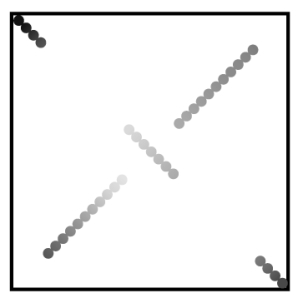
A)One
B)Two
C)Three
D)Four
E)Five

A)One
B)Two
C)Three
D)Four
E)Five

Unlock Deck
Unlock for access to all 38 flashcards in this deck.
Unlock Deck
k this deck
7
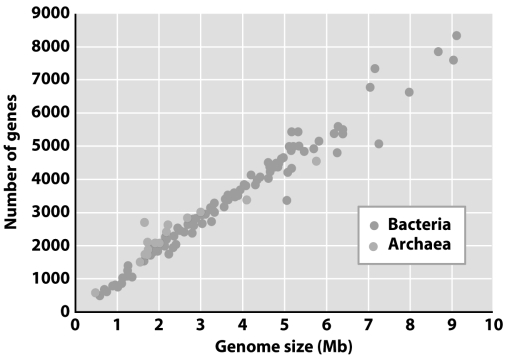 What does the figure above convey about the G-value paradox in prokaryotes?
What does the figure above convey about the G-value paradox in prokaryotes?A)The numbers of protein coding genes increase with genome size.
B)There is no G-value paradox in prokaryotes.
C)Bacteria are more complex than archaea.
D)A and B
E)None of the above

Unlock Deck
Unlock for access to all 38 flashcards in this deck.
Unlock Deck
k this deck
8
Refer to the figure below to answer the following question.A researcher discovers a new bacteria whose genome is ~8 Mb in size.What type of bacteria is this likely to be? 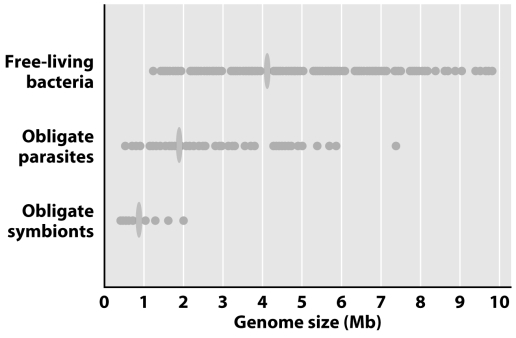
A)Free-living
B)Obligate parasite
C)Obligate symbiont
D)Any of the above
E)Cannot be determined from the information provided

A)Free-living
B)Obligate parasite
C)Obligate symbiont
D)Any of the above
E)Cannot be determined from the information provided

Unlock Deck
Unlock for access to all 38 flashcards in this deck.
Unlock Deck
k this deck
9
Horizontal gene transfer
A)is also known as lateral gene transfer.
B)occurs via transduction.
C)occurs via transformation.
D)occurs via conjugation.
E)All of the above
A)is also known as lateral gene transfer.
B)occurs via transduction.
C)occurs via transformation.
D)occurs via conjugation.
E)All of the above

Unlock Deck
Unlock for access to all 38 flashcards in this deck.
Unlock Deck
k this deck
10
Prokaryotes may have
A)one single circular chromosome.
B)many circular chromosomes.
C)one single linear chromosome.
D)A and B
E)All of the above
A)one single circular chromosome.
B)many circular chromosomes.
C)one single linear chromosome.
D)A and B
E)All of the above

Unlock Deck
Unlock for access to all 38 flashcards in this deck.
Unlock Deck
k this deck
11
Factors that contribute to overall genome size include
A)small genetic elements capable of self-catalyzing their movement.
B)selection on cell size.
C)selection on replication speed.
D)A and B
E)All of the above
A)small genetic elements capable of self-catalyzing their movement.
B)selection on cell size.
C)selection on replication speed.
D)A and B
E)All of the above

Unlock Deck
Unlock for access to all 38 flashcards in this deck.
Unlock Deck
k this deck
12
The G-value paradox states that
A)genome size does not correlate with organismal complexity.
B)the number of protein coding sequences does not correlate with organismal complexity.
C)genome size does not correlate with the number of protein coding sequences.
D)B and C
E)All of the above
A)genome size does not correlate with organismal complexity.
B)the number of protein coding sequences does not correlate with organismal complexity.
C)genome size does not correlate with the number of protein coding sequences.
D)B and C
E)All of the above

Unlock Deck
Unlock for access to all 38 flashcards in this deck.
Unlock Deck
k this deck
13
Transposons
A)move within a genome without making duplicates.
B)move within a genome while making duplicates.
C)use an RNA intermediate.
D)use a DNA intermediate.
E)All of the above
A)move within a genome without making duplicates.
B)move within a genome while making duplicates.
C)use an RNA intermediate.
D)use a DNA intermediate.
E)All of the above

Unlock Deck
Unlock for access to all 38 flashcards in this deck.
Unlock Deck
k this deck
14
Telomeres are necessary because
A)RNA needs a DNA template.
B)Okazaki fragments need a binding region.
C)prokaryotic genomes are circular.
D)DNA polymerase only works in the 5¢ to 3¢ direction.
E)chromosomes would grow during each replication.
A)RNA needs a DNA template.
B)Okazaki fragments need a binding region.
C)prokaryotic genomes are circular.
D)DNA polymerase only works in the 5¢ to 3¢ direction.
E)chromosomes would grow during each replication.

Unlock Deck
Unlock for access to all 38 flashcards in this deck.
Unlock Deck
k this deck
15
GC content refers to
A)the G-value paradox.
B)the C-value paradox.
C)the fraction of G and C nucleotides in the genome.
D)A and B
E)All of the above
A)the G-value paradox.
B)the C-value paradox.
C)the fraction of G and C nucleotides in the genome.
D)A and B
E)All of the above

Unlock Deck
Unlock for access to all 38 flashcards in this deck.
Unlock Deck
k this deck
16
Transposons can be deleterious to a host genome because they can
A)disrupt a protein coding sequence.
B)disrupt regulatory elements.
C)generate mutations.
D)cause recombination errors.
E)All of the above
A)disrupt a protein coding sequence.
B)disrupt regulatory elements.
C)generate mutations.
D)cause recombination errors.
E)All of the above

Unlock Deck
Unlock for access to all 38 flashcards in this deck.
Unlock Deck
k this deck
17
Syntenic dot plots are useful when
A)comparing gene orders in prokaryotes.
B)identifying inversions.
C)examining genomic evolution.
D)A and B
E)All of the above
A)comparing gene orders in prokaryotes.
B)identifying inversions.
C)examining genomic evolution.
D)A and B
E)All of the above

Unlock Deck
Unlock for access to all 38 flashcards in this deck.
Unlock Deck
k this deck
18
Viral genomes
A)may consist of DNA.
B)may consist of RNA.
C)may be linear.
D)may be circular.
E)All of the above
A)may consist of DNA.
B)may consist of RNA.
C)may be linear.
D)may be circular.
E)All of the above

Unlock Deck
Unlock for access to all 38 flashcards in this deck.
Unlock Deck
k this deck
19
How does mutational bias influence GC content?
A)G is more likely to mutate to A.
B)C is more likely to mutate to T.
C)G is less likely to mutate to C.
D)A is less likely to mutate to T.
E)All of the above
A)G is more likely to mutate to A.
B)C is more likely to mutate to T.
C)G is less likely to mutate to C.
D)A is less likely to mutate to T.
E)All of the above

Unlock Deck
Unlock for access to all 38 flashcards in this deck.
Unlock Deck
k this deck
20
Eukaryotic genome size is
A)tightly correlated with organismal complexity.
B)not well correlated with organismal complexity.
C)largest in humans.
D)typically smaller than prokaryotic genome size
E)approximately the same in all eukaryotes.
A)tightly correlated with organismal complexity.
B)not well correlated with organismal complexity.
C)largest in humans.
D)typically smaller than prokaryotic genome size
E)approximately the same in all eukaryotes.

Unlock Deck
Unlock for access to all 38 flashcards in this deck.
Unlock Deck
k this deck
21
While sequencing a bacterial genome,a researcher notes that G is more common on the leading strand than the lagging strand.This is an example of what phenomenon?

Unlock Deck
Unlock for access to all 38 flashcards in this deck.
Unlock Deck
k this deck
22
In the figure below,a double crossing-over event occurs between the Alu elements.How does this event illustrate a means by which introns generate genetic diversity?
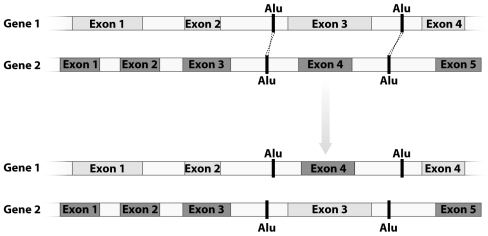


Unlock Deck
Unlock for access to all 38 flashcards in this deck.
Unlock Deck
k this deck
23
In the figure below,what is the range of genome size for protozoa? What does this tell us about the relationship between genome size and organismal complexity?
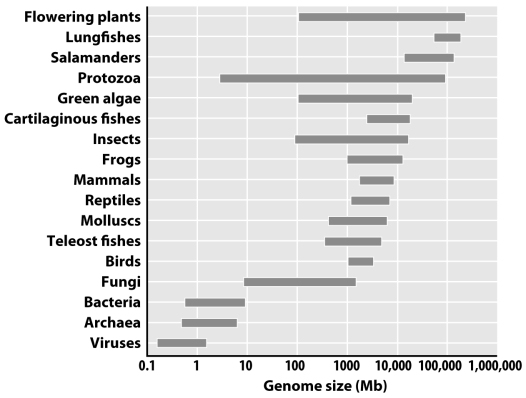


Unlock Deck
Unlock for access to all 38 flashcards in this deck.
Unlock Deck
k this deck
24
What are transcription factors and how do they address the G-value paradox?

Unlock Deck
Unlock for access to all 38 flashcards in this deck.
Unlock Deck
k this deck
25
When comparing recombination rates between a dog,with a genome size of 2410 Mb,and a mustard weed,with a genome size of 100 Mb,which would you expect to have a larger recombination rate per kilobase? Explain your answer.

Unlock Deck
Unlock for access to all 38 flashcards in this deck.
Unlock Deck
k this deck
26
In a 100 bp stretch of a gene,a researcher counts 25 nonsynonymous substitutions,30 synonymous substitutions,and 65 nonsynonymous sites.What type of selection is operating on this gene sequence? Show your work.

Unlock Deck
Unlock for access to all 38 flashcards in this deck.
Unlock Deck
k this deck
27
Describe a haplotype block.

Unlock Deck
Unlock for access to all 38 flashcards in this deck.
Unlock Deck
k this deck
28
The exon theory of genes states that
A)genes consist solely of exons.
B)introns are deleterious and are purged from the genome.
C)introns lead to recombination errors.
D)many current genes arose through the rearrangement of exons.
E)introns disrupt protein structure.
A)genes consist solely of exons.
B)introns are deleterious and are purged from the genome.
C)introns lead to recombination errors.
D)many current genes arose through the rearrangement of exons.
E)introns disrupt protein structure.

Unlock Deck
Unlock for access to all 38 flashcards in this deck.
Unlock Deck
k this deck
29
Recombination rates across a chromosome
A)are highly variable.
B)are large in recombination hotspots.
C)are nearly equal.
D)A and B
E)None of the above
A)are highly variable.
B)are large in recombination hotspots.
C)are nearly equal.
D)A and B
E)None of the above

Unlock Deck
Unlock for access to all 38 flashcards in this deck.
Unlock Deck
k this deck
30
In the syntenic dot plot of E.coli K-12 strains A and B,there are two circled dots in the lower right corner of the plot.How do you interpret the position of these two dots in terms of the gene orders of the two strains?
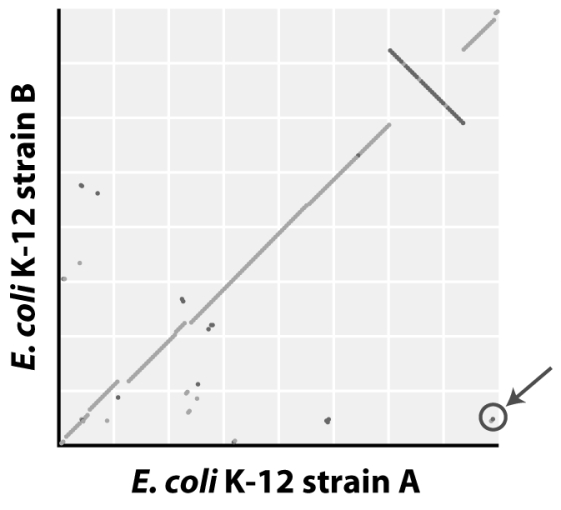


Unlock Deck
Unlock for access to all 38 flashcards in this deck.
Unlock Deck
k this deck
31
Under the neutral model,allele frequency distributions are driven by
A)the effective population size.
B)the mutation rate.
C)selection.
D)A and B
E)None of the above
A)the effective population size.
B)the mutation rate.
C)selection.
D)A and B
E)None of the above

Unlock Deck
Unlock for access to all 38 flashcards in this deck.
Unlock Deck
k this deck
32
Why are transposons considered selfish genetic elements?

Unlock Deck
Unlock for access to all 38 flashcards in this deck.
Unlock Deck
k this deck
33
The McDonald-Kreitman test compares substitution rates
A)between and within species.
B)across two time scales.
C)across genes.
D)A and B
E)All of the above
A)between and within species.
B)across two time scales.
C)across genes.
D)A and B
E)All of the above

Unlock Deck
Unlock for access to all 38 flashcards in this deck.
Unlock Deck
k this deck
34
Explain how horizontal gene transfer is different than sexual reproduction.

Unlock Deck
Unlock for access to all 38 flashcards in this deck.
Unlock Deck
k this deck
35
A researcher collects a soil sample and sequences the entire genomes of two prokaryotes found in the sample.In these genomes,he finds identical prophage DNA located in different areas of the two genomes.Based on the similarity of the sequences of the prophages and their placement in the prokaryotes' genomes,what could he conclude about the relatedness of the two prokaryotes?

Unlock Deck
Unlock for access to all 38 flashcards in this deck.
Unlock Deck
k this deck
36
A limitation of examining Ka/Ks ratios is that they
A)are sensitive to demographic changes.
B)cannot be used in introns.
C)can only detect positive selection.
D)cannot detect drift.
E)None of the above
A)are sensitive to demographic changes.
B)cannot be used in introns.
C)can only detect positive selection.
D)cannot detect drift.
E)None of the above

Unlock Deck
Unlock for access to all 38 flashcards in this deck.
Unlock Deck
k this deck
37
When examining the recombination rate across a chromosome,a researcher detects an area of high recombination rates.What could she infer based on this observation?
A)This region is likely the centromere.
B)This region is likely a telomere.
C)This region is likely an isochore.
D)This region is in a protein coding gene.
E)None of the above
A)This region is likely the centromere.
B)This region is likely a telomere.
C)This region is likely an isochore.
D)This region is in a protein coding gene.
E)None of the above

Unlock Deck
Unlock for access to all 38 flashcards in this deck.
Unlock Deck
k this deck
38
Consider two species,one of which has an effective population size that is five orders of magnitude greater than the other.In which species would you expect to see a smaller genome size? Explain your reasoning.

Unlock Deck
Unlock for access to all 38 flashcards in this deck.
Unlock Deck
k this deck


